- Home
- A. J. Hartley
Act of Will Page 3
Act of Will Read online
Page 3
Probably the best thing to have done would have been to walk calmly and maybe put on a coat or something, but such composure was beyond me. I sprinted aimlessly out into the alley and down the first street I came to, heading as far away from my lodgings as I could and stopped.
Where was I supposed to go? Cresdon just wasn’t that big, and it was entirely walled, all gates heavily guarded. Everyone I knew worked at the Eagle, and those who might still have offered me protection were probably busy worrying about their own necks, possibly from the depths of some imperial dungeon. An unavoidable truth was settling like a rock in my gut, and though I had begun the day worried that I wouldn’t get my life on the stage, I was going to end it with a very different set of priorities. I had to get out of town, perhaps out of Empire territory altogether. I began to run.
SCENE III
Desperate Times
I stopped running outside an inn.
It looked inviting: a board hung stiff in the still air proclaiming it, innocuously enough, the Silk Weaver’s Arms. I had passed it before but never been in, which was probably a plus. I was also thirsty and had detected a comforting smell of malt and hops from the door. I had run more this morning than in the last month. My heart seemed ready to burst, my muscles ached, and my thigh hurt and was still bleeding, however unimpressively. I had to calm down and think what I was going to do next. In short, I needed a beer.
It was dark and cool inside. A handful of quiet drinkers sat at deal tables and didn’t look up as I came in. I stood there sweating heavily and tried to look relaxed as I moved to the bar to order.
“Help you, er . . . miss?” said a big man in a stained leather apron. He looked like he could hump those beer barrels around on his back without losing his breath.
I scowled at him.
“Bitter,” I managed. “Pint.”
His eyes narrowed. I flashed a ladylike smile and straightened my wig.
“Right you are, my lady,” he said, still a little uncertainly, and began to pump a tankard full. I turned away, so that I wouldn’t die of thirst watching him.
“Two bits.”
“Cheers,” I said, pushing a couple of copper pieces across the bar at him.
“Good health, miss,” he said as I drank. “Looks like you need it.”
I gave a thin and lame-sounding laugh and fled into a dark corner by the fireplace.
At the next table a couple of old men were playing dominoes in absolute silence. I tried to think of nothing while my heartbeat and breathing returned to something like normal. After a couple of minutes like this I drained my glass and instantly wanted to find the toilet. Under the strain, I was amazed that my bladder had held out this long. Hell’s teeth, I was a fugitive from the Empire! How could I have been so stupid? I had to get out of this dress and out of town, and perhaps a good deal farther. It was a sickening thought. For all the tales of distant lands I’d acted in, I knew nothing about life outside Cresdon, and there was a part of me that found the idea of ven-turing beyond the city walls almost as terrifying as what the Empire would do to me if they caught me.
Almost. I had been accused of sedition, and then resisted arrest and made the Empire—a small part of it, at least—look silly. I would be proclaimed a rebel, and after that, all bets were off. There was only one punishment for rebels. Actually there were lots of punishments for rebels, many of them inventive and colorful. They just all ended up the same way.
Well, I thought, trying to put a better face on things, putting some mileage between me and Mrs. Pugh’s odious house with its cockroaches and its mice and its alarming breakfasts wouldn’t be all bad. And I’d never have to listen to Rufus’s bagpipe again. Bright side, see?
So, said a nasty voice in my head, that’s settled then. No problem. All you have to do is slip past the thousand armed guards who are currently looking for you specifically, and you’re golden.
Another beer seemed in order.
I got to my feet and looked toward the bar in time to see the street door kick open.
Soldiers. Three of them. I looked for a back door and started moving, wishing I had got rid of the dress and wig the moment I came in.
I made it across the room, staring ahead of me, waiting for an imperious demand to hold-it-right-there, and tried the door. It opened, but it didn’t get me outside, just into a corridor lined with more doors: guest rooms, no doubt. Then there was the sound of hurried boots in the barroom coming my way, and I knew that I had about fifteen seconds.
Bolting down the corridor, I tried one of the doors, but it was locked. The second, likewise. The third swung open and I found myself stuttering apologies and scattering pleas for help at three men and a girl.
They were perhaps as unlikely a group as Cresdon’s uncosmopolitan social milieu would ever see. The girl, who looked about my age, was fair, pale, and slim. I had some experience of looking at pretty girls, and there was no question that this one was a bit special. One of the men—actually, he couldn’t have been much older than the girl—was similarly pale of complexion, though his hair was short and brown and his eyes were green as a cat’s. The other two were of foreign stock, one black, the other of a swarthy olive complexion with dark hair and eyes. These last two had both drawn swords as I came in.
“Help!” I squeaked.
The men peered at me. I snatched my wig off and their eyes widened a little.
“Empire guards!” I blurted, glancing over my shoulder.
It was, apparently, the right thing to say.
For a split second they looked at me, then at each other. Then the girl pulled one of several large trunks from the corner. Her pale male counterpart opened it and wordlessly motioned me over.
Then they started arguing.
“Garnet, are you mad?” hissed the black man. “It could be a trap!”
“We can’t take that chance,” said the girl. “We have to trust her. Him. Whatever.”
Even in my terror I managed an indignant glare.
“It isn’t worth the risk,” replied the black man heatedly.
“Who are you?” the olive-skinned man asked me quietly.
I thought I could hear the guards forcing the door of the first guest room. My moments of liberty were numbered and I wanted to scream at them. The sweat broke out on my brow and my eyes widened with fear, but I restrained myself and gasped, “William Hawthorne. I’m an actor. And a playwright. And,” I added reluctantly, “I kind of cheated at a card game.”
“A petty criminal,” said the black man, rising to his feet. He was impressively built and in alarmingly good condition. In fact, all of them were. He looked me up and down, his eyes lingering on the bloodstained dress and then, as the door to the second guest room was audibly kicked open, flashed his eyes to the olive-skinned man who had demanded my name and who, I sensed, would have the last word.
I was right. For a second he said nothing, and then he whispered, “Get in the box. Quickly!”
The black man bundled me into the crate and sat on it.
“Oh, brilliant,” I mumbled. “Put him in the box. They’ll never think to look there.”
The room fell silent for a second and then, muffled slightly by the wood of the crate, I heard the door open and imperious footsteps enter.
“Any of these?” demanded a soldier.
“No,” replied a voice I took to be the innkeeper’s.
“Has anyone been in here?”
Muffled negations and murmured inquiries as to what the problem was.
“Open those boxes!”
Blood and sand!
I heard movement and a creaking lid, then another; then I saw daylight, and the irritated face of a soldier peering in at me.
SCENE IV
A New Problem
The soldier’s eyes lit up: he drew his sword swiftly and had begun to shout when something stopped him. There was a brilliant flash, yellowish, like firelight, but sudden and stark, so that everything solid went flat and pale, casting hard shadows
. I think there was a sound too—a bang? Or a sudden and powerful gust of wind? I wasn’t sure. And there was something else, something like falling asleep after too much beer and coming to again with a raging hangover, except that the entire process lasted no more than a few seconds. It was panic, I supposed, and some kind of weird head rush at being shoved into a crate with an Empire soldier about to drag me off to torture and execution. That had to be it.
But there was more. They were fighting. There was grunting and the unmistakable crash of metal on metal, and then a gasp of pain and the sound of a falling body.
God! I was involved in a murderous brawl with Empire guards: a capital offense if ever there was one. I clambered out of the box and started to crawl away.
Someone stepped over my back. I heard a weapon fall and then what sounded like cracking bone. I closed my eyes tighter till someone stood on my wrist and, with a yell of pain, I looked up. The pale kid who had been called Garnet faced a man who might have been the patrol officer. They had their fingers about each other’s throats and were fighting for control of the soldier’s shortsword. The other soldiers, astonishingly, seemed to be already dead. Or stunned, perhaps, since I could see no blood or wounds. The black man joined the last remaining fight, lending his considerable strength to wrenching the officer’s sword from his hand. The officer glared furiously as his strength gave out; then the kid freed himself, hit him once, very hard, in the face, and watched him crumple to the floor.
I struggled to my feet, struck again by how light-headed and unsteady I felt. By the time I was upright the three soldiers weren’t, and my barbaric saviors were busy binding the innkeeper’s hands and gagging his mouth with a pillowcase. The girl was standing over the officer who had gone down the hardest with a broadsword pointed at his neck. Something in her eyes was as scary as the sword point. It was time for me to get the hell out.
The pale man with the piercing green eyes was nursing his wrist, but the group was calm, businesslike despite their earnest speed and horrifying efficiency, as if this wasn’t the first time they’d dealt with Empire soldiers. I looked at the girl, half expecting to see her break down or scream hysterically, but she was as cool as the rest of them.
I coughed and muttered, “I’m dead. I may as well hang myself right now. ‘Put him in the box,’ they said, Your Worship. That’s it. I’m dead.” With a miserable whine of despair I looked at the bodies and added, with what I thought to be unmistakable sarcasm, “Great. Thanks a lot. I don’t know who the devil you people are but you just did me a real favor.”
The pale man looked at me with his homicidal green eyes and shrugged as if I had praised them.
“It was nothing,” he said. “They were looking for you, not us. They were off their guard, their weapons were sheathed, two of them had their backs to us, and we had one extra pair of hands.”
My disbelief found a new focal point. They were mad. They had to be.
The girl caught my glance and her smile slipped away, her blue eyes freezing onto mine with undisguised indignation. I swallowed and looked down.
“Time for some introductions and then a dressing of that wound,” said the olive-skinned man. I gave him a look of frank incredulity and bit my tongue. These maniacs had just casually assaulted three Empire guards, and were now going to invite me over for tea and crumpets.
“You just killed three people!” I exclaimed, unable to restrain myself further. “You just bloody killed . . . I don’t believe this. You just killed three people! Don’t you get it? Three! Count them. Now what? Eh? Who should we kill next? The emperor? No. Here’s an idea: Kill me. Please, go ahead. I’d hate to hold you up. You must have some children to massacre or something, so come on and get it over with. Save the Empire a job.”
“They aren’t dead,” said the black man.
“What?” I muttered.
“They aren’t dead,” he repeated. “Any of them. Though I thought that last one was going to give us no choice.”
“No choice?” I said, incredulous. “He nearly forced you to butcher him in cold blood? If someone says hello to you in the street, is that grounds for garroting? I mean, you must have all kinds of interesting ways of killing people who—I don’t know—ask you what time it is, or offer you a piece of fruit or—”
He clapped his hand over my mouth.
Actually, I was surprised they’d let me go on as long as I had. The pale kid stepped towards me with the guard’s shortsword in his hand and hatred in his emerald eyes. I struggled in the black man’s grip but couldn’t move. I shut my eyes and waited for the thrust of steel through my stomach. It didn’t come and, after a moment of stillness, I opened my eyes.
My would-be attacker had halted and turned his back on me, muttering his fury to the girl. More anxious glances were swapped, but the apparent leader stilled them with a gesture of his hand and a stern look at me. I swallowed hard and tried to regain composure.
“This is Orgos,” he said, indicating the black man, who took his big hand away from my mouth and extended it, smiling.
I stared at them in stunned silence as the introductions were concluded and my brain boiled softly. The pale savage who was no more than twenty was called Garnet, as I had already gathered, and the girl, who still hadn’t quite forgotten my look of distrust, Renthrette. I gave her a friendly smile and kind of wished I’d been more impressive during the fight. Kind of.
“We do not use the names we were born with anymore, so I am taking no unnecessary risks,” their swarthy leader went on. “I am Mithos, and I—”
“Mithos!” I bawled. “The Mithos! Oh God! Mithos the thief, bandit, cutthroat, and wholesale murderer?”
“You should know better than to trust the Empire’s propaganda,” he remarked grimly.
“All right,” I backpedaled, knowing the terms these psychopaths preferred to be known by, “Mithos the rebel and adventurer?”
“The same,” he said.
SCENE V
Things Can Always Get Worse
Adventurers” hired themselves out as investigators, guards, explorers, and specialists of various kinds, particularly if the assignment involved a balancing act between risk and profit. In effect they were burglars, thugs, murderers, and grave robbers. The Empire, in a rare moment of insight, had made the profession illegal. Adventurers were untrustworthy, and if they obeyed any laws at all, they were those of their own personal and erratic honor code. This made them dangerous people to have around and clearly a threat to the “peace” and solidity of the Diamond Empire. The Empire, moreover, had learnt that the likes of my dangerous saviors had organized much of the opposition during the initial invasion of Thrusia and continued to lead uprisings when the mood took them. “Adventurers” were rebels by any other name.
As a result, the identity of adventurers was information much sought after by the Empire’s many spies and collaborators. One of the most notorious adventurers, a rebel whose name appeared on wanted lists all over Cresdon, was sitting three feet from me right now.
Reports of Mithos’s physical appearance were fraught with contradictions, but I could think of half a dozen brutal attacks motivated solely by greed, the desire to eat small children, etc., that had been linked to his name. The knowledge did not make me comfortable.
I should say that I do not much like the Empire. Thrusia, the mountain region in which Cresdon is situated, fought hard against the invaders but fell the year I was born. Since then we have paid for our defiance. It seems to me that the best policy is to keep your head down and say nothing, which, until today, and despite my somewhat checkered career in the theatre, is exactly what I had done.
As ever, for those who can come to terms with the presence of an occupying force there is some profit. I have never actively collaborated with the Empire, but I have become, I must admit, a pretty passive subject. In truth I was—or assumed I was—too insignificant for them to take notice of me. I had lived like a flea on the carcass of their town and they had given me the atten
tion a flea merits. Until about half an hour ago. And now I was sharing a room with the most wanted man in Cresdon and his conspicuously homicidal side-kicks.
To cheer myself up I tried to sit next to the girl, Renthrette, who I figured was one of their girlfriends. It seemed fairly sure that I could make her like me for my wit if not for my physique, but, for the moment at least, she was doing a pretty convincing job of ignoring me completely. I found myself sharing a box with Orgos, the one who had sneered at me for being a petty criminal and then committed about half a dozen capital offenses in as many seconds. I looked at the girl for comfort and it cheered me up a little until I felt her acid eyes upon me. I gave her my long-practiced winning smile, but she met it with a look that would have leveled a small building and turned her back on me.
God, what a fiasco.
The four of them pumped me for information about myself. I repeated what I had told them already: who I was, where I lived, why I was running from the Empire, etc. I talked, gripped as I was both by fear of the Empire showing up at any moment and by fear of what this band of cutthroats would do to me if I didn’t humor them. Perhaps I could bolt for the door when they weren’t looking, get out and tell the first patrol I could find that I could hand them Mithos; that would get me off Whatever charges were leveled at me, wouldn’t it? Orgos laid his massive sword across his knees and watched me. Absently, he tested the edge with his thumb, his eyes on mine.
I gave up the idea of running. For the moment.

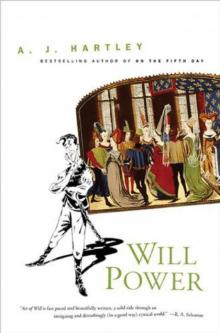 Will Power wh-2
Will Power wh-2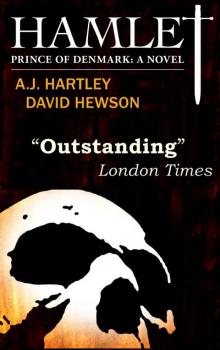 Hamlet, Prince of Denmark
Hamlet, Prince of Denmark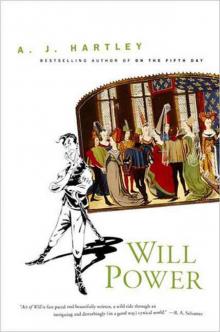 Will Power
Will Power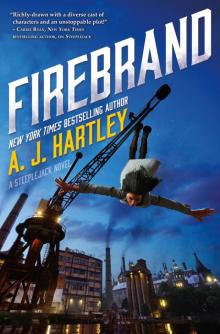 Firebrand
Firebrand A Novel
A Novel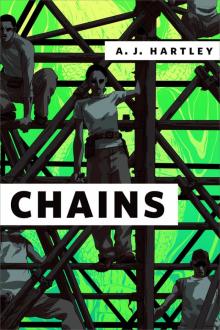 Chains
Chains Guardian
Guardian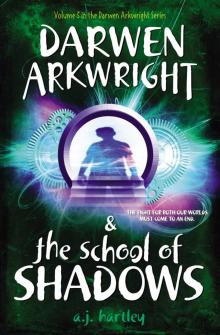 Darwen Arkwright and the School of Shadows
Darwen Arkwright and the School of Shadows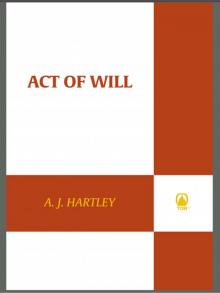 Act of Will
Act of Will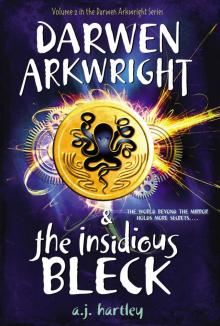 Darwen Arkwright and the Insidious Bleck
Darwen Arkwright and the Insidious Bleck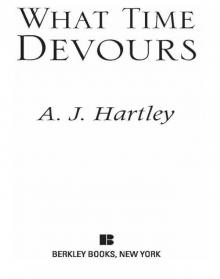 What Time Devours
What Time Devours